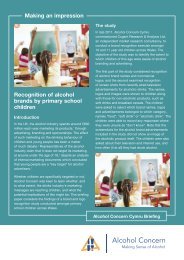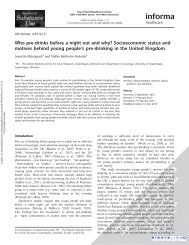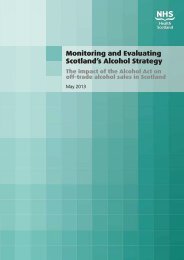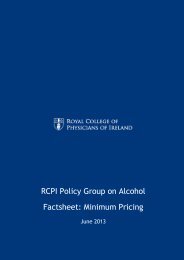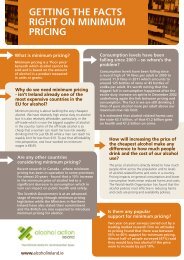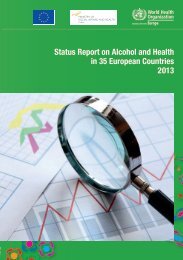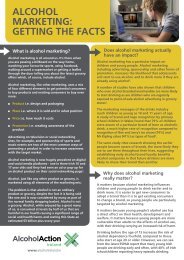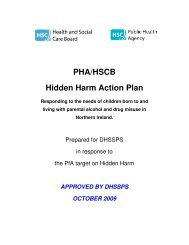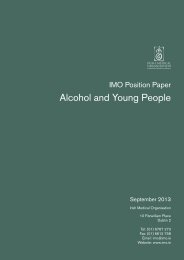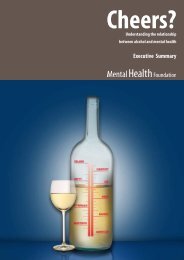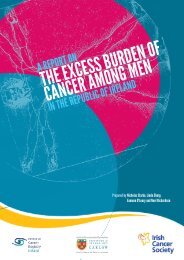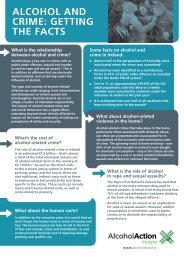Addressing the harmful use of alcohol - WHO Western Pacific Region
Addressing the harmful use of alcohol - WHO Western Pacific Region
Addressing the harmful use of alcohol - WHO Western Pacific Region
You also want an ePaper? Increase the reach of your titles
YUMPU automatically turns print PDFs into web optimized ePapers that Google loves.
<strong>Addressing</strong> <strong>the</strong> <strong>harmful</strong> <strong>use</strong> <strong>of</strong> <strong>alcohol</strong> : A guide to developing effective <strong>alcohol</strong> legislation<br />
- The final form that provisions should take (such as compliance with domestic<br />
legislative drafting style, identifying appropriate penalties, identifying enforcement<br />
powers for <strong>of</strong>ficers under similar legislation, identifying appropriate provisions for <strong>the</strong><br />
establishment <strong>of</strong>, appointments to, and accountability <strong>of</strong>, and statutory bodies).<br />
- The effect <strong>of</strong> <strong>the</strong> country’s Constitution and o<strong>the</strong>r laws on any proposed <strong>alcohol</strong><br />
control law (see discussion below).<br />
- Compatibility <strong>of</strong> <strong>the</strong> measures with any international obligations (e.g. trade<br />
agreements).<br />
- Means <strong>of</strong> minimizing compliance costs while achieving <strong>the</strong> desired outcomes.<br />
- Best means <strong>of</strong> conveying <strong>the</strong> rationale for, and explaining <strong>the</strong> requirements <strong>of</strong>, <strong>the</strong><br />
legislation to <strong>the</strong> public. and<br />
- Strategies to respond to criticism and lobbying by opponents <strong>of</strong> <strong>the</strong> legislation, such<br />
as <strong>the</strong> <strong>alcohol</strong> industry.<br />
• The identification <strong>of</strong> resources (persons and financial) to facilitate <strong>the</strong> implementation <strong>of</strong><br />
<strong>the</strong> legislation.<br />
• The development <strong>of</strong> an information/education plan for those affected by, or interested in,<br />
implementation <strong>of</strong> legislation, such as a new or streng<strong>the</strong>ned licensing system. This plan<br />
should ideally include a range <strong>of</strong> measures to inform people <strong>of</strong>:<br />
- Exactly what <strong>the</strong> legislation provides for, and explaining peoples’ obligations under it;<br />
- The rationale for <strong>the</strong> legislation (what it will achieve, e.g. public health benefits) and<br />
<strong>the</strong> evidence in support <strong>of</strong> <strong>the</strong> measures that are proposed;<br />
- Time-frames for compliance with <strong>the</strong> legislation (including any transition times);<br />
- How <strong>the</strong> legislation will be implemented (commitment to enforcement, but focus<br />
initially on education and encouraging compliance); and<br />
- Where to go for fur<strong>the</strong>r information.<br />
• The establishment <strong>of</strong> bureaucratic structures, mechanisms and processes to give effect to<br />
<strong>the</strong> legislation (e.g. mechanisms for licensing, development <strong>of</strong> signage for retail outlets).<br />
• The appointment and warranting <strong>of</strong> enforcement <strong>of</strong>ficers, and effective training <strong>of</strong> those<br />
<strong>of</strong>ficers.<br />
• The development <strong>of</strong> regulations in support <strong>of</strong> and to give effect to <strong>the</strong> primary legislation.<br />
Consultation <strong>of</strong> interested parties<br />
The implementation plan should also include measures to ensure appropriate consultation and<br />
information exchange with stakeholders and <strong>the</strong> general public. This approach may be by way<br />
<strong>of</strong> a public discussion document and meetings with public health interest groups and also with<br />
industry representatives prior to drafting a bill. The formal political processes <strong>of</strong> law-making<br />
also <strong>of</strong>fer all parties opportunities to express <strong>the</strong>ir views and concerns.<br />
102 Return to TOC



